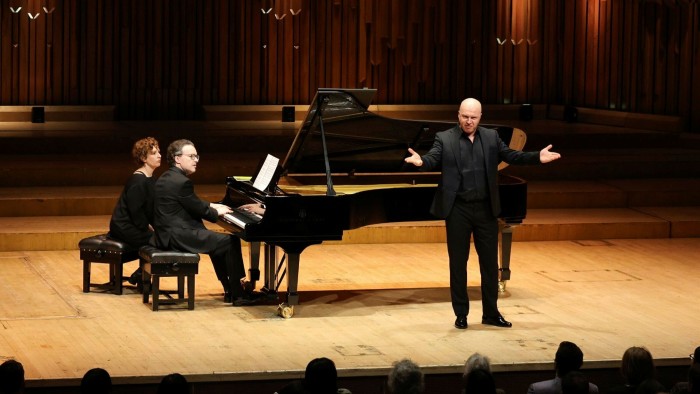Summarize this content to 2000 words in 6 paragraphs in Arabic Unlock the Editor’s Digest for freeRoula Khalaf, Editor of the FT, selects her favourite stories in this weekly newsletter.It is hard to know how best to mark the 50th anniversary of Dmitri Shostakovich’s death. His music is so widely played that obvious high-profile tributes, like a complete cycle of the symphonies, cannot offer much that is new or overlooked.The recitals being presented by the Barbican are relatively modest, but they have the advantage of focusing on the chamber music. The backbone of the offering is a cycle of the string quartets, performed by the Carducci Quartet over five concerts this spring (with the next on February 28). The quartets are familiar visitors to recital venues, but the Barbican has also ventured further afield.“Commemorating Shostakovich” was an all-star chamber music evening with pianist Evgeny Kissin and friends, namely violinist Gidon Kremer, violist Maxim Rysanov, cellist Giedrė Dirvanauskaitė and bass Alexander Roslavets. After London, they will be taking the programme, at a leisurely pace, on to New York and Salzburg.Appropriately, given the occasion, the recital was built around Shostakovich’s final works. By the 1970s the Soviet Union had moved on from the rigid dictatorial grip of the Stalin era and Shostakovich, previously in the line of fire owing to his celebrity, was able to breathe a freer air. The landscape of his music expanded to take in new vistas. Sometimes he looks directly at the past history of political abuse with a determinedly dry eye. At other times, most movingly, he surveys a wasteland of grief.Kissin started this recital with songs, probably the least well-known category of Shostakovich’s output owing to the barrier of language. The Four Verses of Captain Lebyadkin (1974), based on a character from Dostoevsky’s 1871 novel The Demons, finds the composer at his most bizarre. He portrays Lebyadkin, in his words a “buffoon” but “frighteningly creepy”, contradicting himself, performing about-turns of logic and telling the pianist to stop and start again. They are tough nuts to crack for a non-Russian audience, but Roslavets sang them with elan and a first-class bass voice.In the centre of the programme came the Piano Trio No 2, dating from 1944. There is a wartime immediacy to the music here, especially in the use of Jewish-style themes possibly inspired by reports from the concentration camps. The sheer authority of Kissin’s hard-edged playing rather dominated Kremer’s tremulously sensitive violin and Dirvanauskaitė’s warmer lyricism on the cello.There could be no more fitting end than the Viola Sonata (1975), Shostakovich’s very last work and a culminating expression of the seriousness of his music at its highest level. The combination of Rysanov’s deeply eloquent playing and the absolute certainty of Kissin made for a compelling performance. In the final movement Shostakovich looks back over his life and weaves in short quotations from his own works, including all 15 of his symphonies in order — so now we have had an anniversary cycle of the symphonies after all.★★★★☆barbican.org.uk
rewrite this title in Arabic Kissin and friends review — an all-star recital of Shostakovich’s final works
مقالات ذات صلة
مال واعمال
مواضيع رائجة
النشرة البريدية
اشترك للحصول على اخر الأخبار لحظة بلحظة الى بريدك الإلكتروني.
© 2025 جلوب تايم لاين. جميع الحقوق محفوظة.


